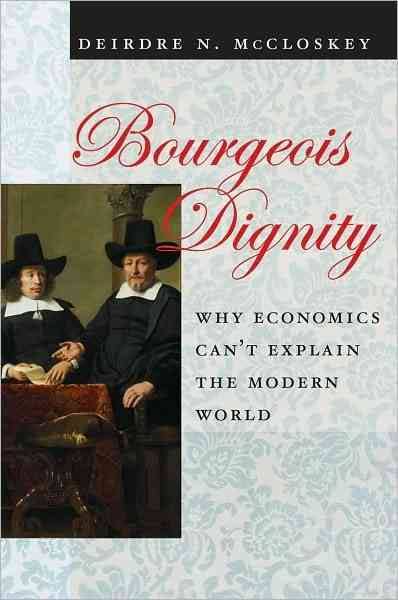
If you think of economics as a study of how we create wealth, economic theory was pretty much anybody’s guess until we finally made some. For thousands of years the daily consumption of an individual remained pretty set at around $3 a day.
“Economic history has looked like an ice hockey stick lying on the ground. It had a long, long horizontal handle at $3 a day extending through the two-hundred- thousand-year history of homo sapiens to 1800, with little bumps upward on the handle in ancient Rome and the early medieval Arab world and high medieval Europe, with regressions to $3 afterward – then a wholly unexpected blade, leading up in the last two out of the two thousand centuries, to $30 a day and in many places well beyond.” (- McCloskey) Modern day consumption in countries such as Japan or France hovers around a $100 a day, or in the United States of $120 a day, or in Norway of a $137.
Even at my age I can read a thick, thought provoking book. What say? And what I don’t remember, I can go back and check. The benefit is that I have a bit of my own history and experience to check it against. This is generally the reason a lot of wisdom is wasted on the youth, I’d guess.
Coincidentally, economics finds itself, at this juncture, in much of the same situation as me. The world has recently suffered an experience with which to judge its former life against. And, the metrics are available to measure the reality and amounts of said experience.
This “Great Fact of economic growth discovered by historians and economists in the 1950s and elaborated since then,” has changed everything. The experience, which Deidre’s book circles, is of an amazing burgeoning of world wealth beginning first in Holland, and then Britain in the 1840s, and then experienced successively by other countries. “The Big Economic Story of our own times is (when) the Chinese in 1978 and then the Indians in 1991” hopped onto the hockey stick of growth also.
McCloskey has it that modern economics has tended to view the Great Fact of our recent hockey stick growth in narrow materialistic terms because ‘the light is better there’. McCloskey’s retort would be, ‘but that’s not where the money was made…’ Then he assiduously dismantles all of the classical economic explanations, using material statistics and facts, many previously unavailable to earlier economic theoreticians.
Classical economists like their prudent investors with their rational behavior, but this in not where the money is presently, nor was, at one time, made, McCloskey states. Rational behavior does not create much wealth. The historical record demonstrates that rational maximizing behavior generates rather paltry or even unremarkable growth. One by one, McCloskey eliminates each of the classical economic explanations for the Great Fact – and finds each sorely lacking. In doing so, he explodes some common beliefs.
For example, wealth is not created by robbing the poor – because they have none. Certainly some miscreants benefit, but little wealth is obtained.
Slavery was of very little economic benefit to anyone in the supply chain, save the initial en-slavers, who were generally other tribesmen. The South’s economy would have generated wealth without slavery nearly as it had with.
Trade generates little wealth. It merely shuffles it around.
The mercantile system likewise generated little increased wealth. (Though people obviously thought it did!) While the great business houses (such as the East India Company) might have made some return, the nation’s citizens generally did not share – and more likely suffered from the increased taxation wrought by the duties of imperialism. For example, losing the American colonies was of an economic relief to the British.
Even education and scientific research are found lacking as explanations of the Great Fact. Practical innovative insights generally preceded scientific explanation. And education can often be counterproductive. As McCloskey displays, if the wrong lessons are taught and the wrong social structures solidified, an economy can easily stagnate.
McCloskey assiduously eliminates explanation after explanation in order to surround and describe a more humanistic explanation for the Great Fact which is statistically harder to measure. McCloskey believes that the Great Fact is explained by innovation, which alone has the power to create great wealth. And he explains the origins and growth of innovation by way of the Bourgeois Revaluation: a cultural transformation, in which added to the value of prudence in handling ones finances, the bourgeois also found the liberty to innovate and cultural dignity for doing so. These two principles, in McCloskey’s telling, unleashed a burgeoning economy through the creation of wealth through innovation – doing it better and easier.
Virtue has been often held up to be its own reward. So it can be calming and reassuring to read a book in which Virtue makes us a lot of money, too -especially when the thinking seems to be wide-ranging and credible. You might enjoy reading this one – a little bit nightly, taken like a pill following the evening news – with a little tea and chocolate, your dog and cat.

If you enjoyed this post, you may try more of Carl Nelson found here: http://www.magicbeanbooks.co/home.html
Tags: Bourgeois Liberty and Dignity, Business, Economic History, economics, ideas, politics, The Great Fact, Wealth Creation
Leave a comment